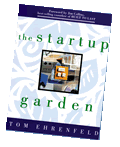
Just Managing: The Ironic EconomyThe approach of a new year marks a good time to take stock of the prevailing ideas driving the Internet Economy. Never before has the power of ideas been so valuable in the economy, yet never before has the value of these ideas seemed so hard to pin down. Doing business in the Internet Economy brings to mind the concept of irony - those factors that make it possible to do business are the very ones that threaten to destroy what you have created. I've heard the so-called new economy dubbed "The Internet Economy," "The Entertainment Economy," "The Experience Economy" and more. This year-end, my working title is "The Ironic Economy," because the migration of matter to the Net has created a number of philosophies that were thought to be fleeting. Here are a few of the truisms that, ironically, have endured: 1. The biggest benefactors of new media ... are old media. Current slump notwithstanding, the surge of the Internet has proved to be the biggest blessing for the old-fashioned magazines that get sent through that quaint postal system. This week Fast Company, one of the oldest "new economy" magazines in a niche that includes Business 2.0 and yours truly The Industry Standard, was sold for $360 million, with another $150 million thrown into the deal should it hit certain targets. And going forward, despite a decline relative to last year, look for millions to be spent by dot-coms on advertising in this year's Super Bowl. 2. The more technology provides, the more companies find themselves competing over what technology cannot provide. Many of the most spectacular failures of the past year were due to bad managerial decisions. Sure, it's easy to attribute poor judgment to companies that have tanked, but it's pretty hard not to gawk at the outrageous death-wish spending of a company like Boo.com. 3. The newer the idea and the bolder the vision, the more experienced and risk-averse you must be in order to make it work. Any Nethead can come up with an idea that will change the world. But the most influential and enduring Internet companies, such as Amazon, Yahoo and eBay, have managed to deliver on their promise by bringing in smart and seasoned talent for key spots. 4. The more open, democratic and accessible the Web, the greater the need for editors, filters and info-czars. Basically, discernment trumps access. It's far more interesting to read a smart critique of a homepage than it is to read the actual homepage. Most of the best and smartest features on the Web are the result of smart intervention by people who make sense of the Internet's information glut. Two great examples are TheStandard.com's Media Grok and Jim Romenesko's MediaNews site. Both cull news about the media for the benefit of folks in the trade. 5. Trust is the most important ingredient in making an Internet startup work - and yet trust exists the least where it is discussed the most. I won't belie this point by saying more. 6. The more that work and family blend, the less you have of each. This I know from experience. As one of the millions of free agents/independent contractors who work at home, I know the greatest thing about working at home is that I can see my kids at almost any time. Likewise, the worst thing about working at home is that I can see my kids at almost any time. 7. Temporary-ness creates permanence. The more things change, the greater the opportunity to build something enduring. One of the most successful types of new companies are those that are lessors of temporary consultants to growing companies. Marion McGovern has created a thriving San Francisco-based company named M2, which matches up independent consultants with companies seeking temporary high-level expertise. Her success is made possible by the accelerated metabolism of the economy and is fomented by the rich-gestation climate of the Internet world. 8. The dematerialization of matter hasn't materialized. Despite the claims that physical goods are being threatened with surrogate digital clones, the need for books or CDs or even plain-old letters hasn't abated despite the easy availability of virtual versions. Just about every physical thing that the Web has stripped away gets replaced by something else. |
THE BOOK Read or print the Intro and Chapter 1. Read the book reviews at Inc and 1-800-CEO-READ. Read the publisher's press release. Buy this book from Amazon.com. Visit the companies that Tom discusses in the book Hear a recent lecture by Tom on the Startup Garden STARTUP KIT Buy my book and I will send you a worksheet and list of local and industry resources for your startup. Simply send me an email with your zip code and type of company and I will email you the free kit. Thanks! TOM'S WRITING Just Managing – articles that Tom wrote for The Industry Standard and some Business Articles written for Inc., Fortune Small Business, Harvard Management Update, and other places. RESOURCES Read about other books and web sites about starting your own business. |
| © 2001-2003 Tom Ehrenfeld | Site design by Tim Swan | |
